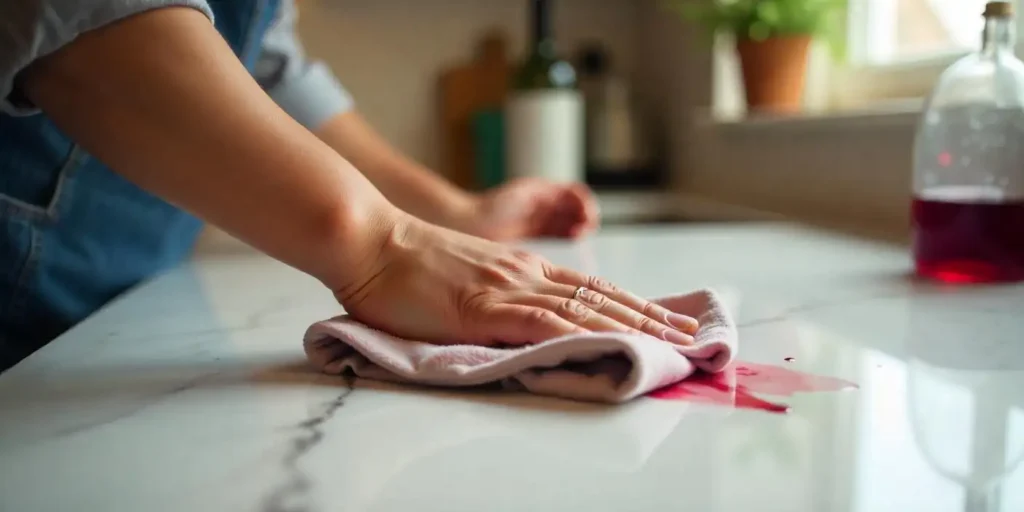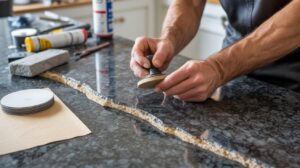How to Get Stains Out of Marble | Best Tips in 2025
Marble has graced palaces, museums, and luxury homes for centuries its luminous veins and timeless allure turning ordinary spaces into works of art. Yet, for all its beauty, marble harbors a delicate secret: its porous surface is a magnet for stubborn stains. A spilled glass of red wine, a forgotten coffee cup, or a splash of olive oil can leave even the most pristine countertop looking dull and damaged. If you’ve ever wondered how to get stains out of marble without harming its natural elegance, you’re not alone.
The good news? Those unsightly marks don’t have to be permanent. With the right techniques, you can rescue your marble from everyday accidents and restore its showstopping shine. This guide cuts through the confusion, offering step-by-step solutions for removing everything from oil splatters to water rings plus pro tips to prevent future stains. Whether you’re battling a fresh spill or a years-old blemish, you’ll learn how to tackle marble stains like a pro, ensuring your surfaces stay as breathtaking as the day they were installed.Let’s transform your marble from dull to dazzling no professional help required.
Table of Contents
ToggleAct Fast: Save Your Marble from Spills Before Stains Set In
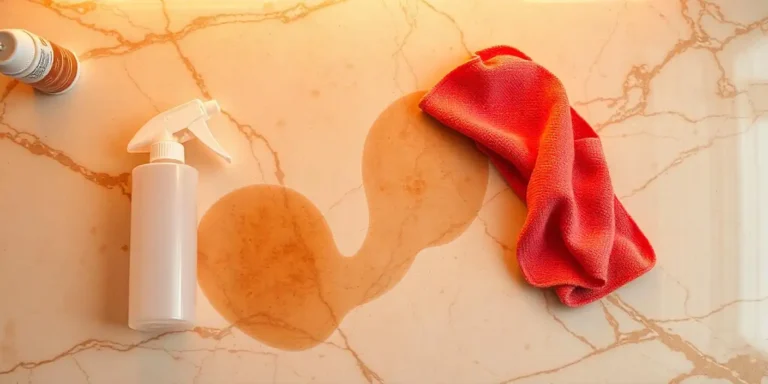
Marble’s delicate pores act like tiny sponges the longer a spill sits, the deeper it seeps. A single delay could turn a simple cleanup into a stubborn marble stain removal nightmare. Here’s how to stop stains in their tracks:
1. Blot, Don’t Rub
Grab a soft microfiber cloth (no paper towels!) and gently press don’t scrub the spill. Rubbing pushes liquids deeper, making cleaning stained marble far harder.
2. Dampen, Don’t Drown
Lightly dampen the cloth with pH-neutral water. Avoid soaking the area, as excess moisture can worsen the problem.
3. Skip the Harsh Stuff
Vinegar, bleach, or generic sprays? Big mistake. Acidic or abrasive cleaners etch the surface, turning a small spill into a permanent scar.
Pro Tip: For sticky spills (like syrup), mix a drop of dish soap with warm water. Test it on a hidden spot first!
Nail this routine, and you’ll dodge 90% of stains no poultice required.
8 Marble Stains Decoded: Remove Them Like a Pro
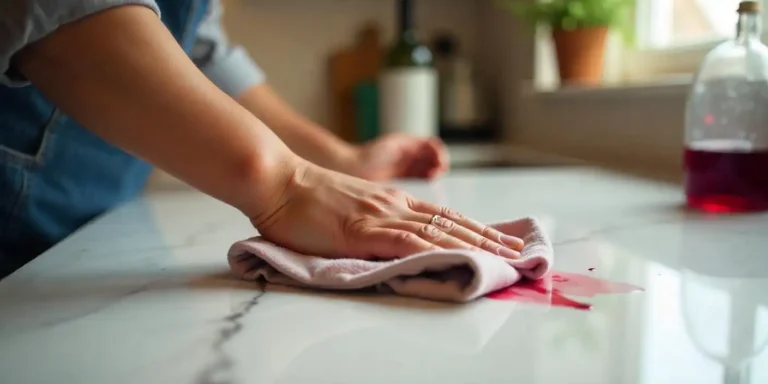
Most marble stains can be effectively lifted with a homemade poultice a thick, absorbent paste designed to draw out deep-set stains from the stone’s surface. By using the right ingredients, a poultice can break down and extract stubborn discoloration, restoring your marble’s natural beauty. In the following section, we’ll explore how to tackle different types of stains and the best techniques to remove them.
Oil-Based Stains: The Sneaky Kitchen Culprits
Causes: Cooking oil splatters, greasy fingers, lotions.
Looks Like: Yellowish smudges or “wet spots” that won’t fade.
Fix It Fast:
- Create a poultice with mineral spirits (1:1 ratio with baking soda).
- Let it sit for 24 hours to lift grease trapped in pores.
Pro Tip: Blot excess oil with cornstarch first it absorbs residue before it sets!
Organic Stains: Coffee Rings & Food Spills
Causes: Coffee, tea, berries, or forgotten takeout containers.
Looks Like: Dark brown rings or blotches.
Fix It Fast:
- Mix 6% hydrogen peroxide + baking soda into a thick paste.
- Avoid on dark marble (may lighten color).
Watch Out: Letting citrus sit causes both stains and etches wipe juice spills ASAP!
Rust Stains: The Bathroom Saboteur
Causes: Wet metal cans, shaving cream caps, or bathroom fixtures.
Looks Like: Orange-brown streaks or speckles.
Fix It Fast:
- Use a non-acidic rust remover (like RustOut).
- For deep stains, call a pro DIY scrubbing can scratch the stone.
Water Stains: Hard Water’s Calling Card
Causes: Mineral-heavy tap water, neglected water glasses.
Looks Like: Cloudy white patches or “ghost” marks.
Fix It Fast:
- Buff gently with Grade 0000 steel wool (yes, it’s safe!).
- Follow up with a marble polish to restore shine.
Mold Stains: Bathroom’s Worst Enemy
Causes: Humid showers, poor ventilation.
Looks Like: Black/green splotches (often mistaken for “blue on marble sink”).
Fix It Fast:
- Spray a mold-specific cleaner (like RMR-86) and let it penetrate for 10 mins.
- Never use bleach it feeds mold spores!
Ink Stains: The Office Meets Marble
Causes: Leaky pens, wine labels, kids’ art projects.
Looks Like: Bold streaks in blue, red, or black.
Fix It Fast:
- Dab with acetone (for non-porous marble) or hydrogen peroxide poultice.
- Blot, don’t rub ink spreads fast!
Etch Marks: Acid Attacks
Causes: Lemon juice, vinegar, or tomato sauce.
Looks Like: Dull, faded patches (not a true stain).
Fix It Fast:
- Polish with marble polishing powder (like Tenax).
- Key Difference: Etching removes stone layers; stains sit on top
Paint Stains: DIY Gone Wrong
Causes: Accidental drips, kids’ crafts.
Looks Like: Color-matched splatters (latex, acrylic, etc.).
Fix It Fast:
- For wet paint: Wipe with a microfiber cloth + warm water.
- For dried paint: Apply lacquer thinner with a cotton swab.
- Save Your Sanity: Large spills? Call a SF Marble & Granite experts.
Final Tip: Bookmark this guide your marble will thank you later!
How Do You Make a Marble Poultice? Your Secret Weapon Against Stains
A poultice is the ultimate DIY solution for how to get stains out of marble it works like a magnet, pulling stains from deep within the stone’s pores. Whether you’re tackling oil splatters (remove oil stain from marble) or mysterious blue marks (removing blue on marble sink), this method is your go-to fix.
How to Make & Apply a Poultice
Step | Action | Details |
1 | Mix the Poultice | Combine your solvent (e.g., 6% hydrogen peroxide for organic stains, mineral spirits for oil) with baking soda or powdered chalk. Aim for a thick, peanut butter-like paste. |
2 | Prep the Stain | Clean the area with mild soap and water. Lightly dampen the stain this helps the poultice penetrate deeper. |
3 | Apply the Paste | Spread the poultice ¼–½ inch thick over the stain, extending 1 inch beyond its edges. |
4 | Seal & Wait | Cover with plastic wrap, tape the edges, and let it sit 24–48 hours. The longer it sits, the more stain it extracts! |
5 | Remove & Reveal | Gently scrape off dried paste with a plastic spatula. Wipe residue with a damp microfiber cloth. Avoid metal tools they scratch! |
6 | Repeat if Needed | For stubborn stains (like removing blue on marble sink), reapply the poultice. |
Why This Works
The poultice works by soaking into the marble’s pores, dissolving the stain, and drawing it upward into the paste. It’s especially powerful for:
- Oil stains: Mineral spirits break down grease trapped in the stone (remove oil stain from marble).
- Organic stains: Hydrogen peroxide lifts coffee, wine, or mold (how to remove stains from marble).
- Mystery stains: For odd discolorations like blue marks, adjust the solvent based on the stain type.
Pro Tips:
- Test solvents on a hidden area first some may lighten dark marble.
- Use distilled water to mix the poultice if you have hard water.
- Patience is key! Rushing the process = incomplete stain removal.
By mastering this technique, you’ll solve how to get stains out of marble like a pro no expensive cleaners needed.
When Stains Won’t Budge: Next Steps

Even with your best efforts, some stains dig their heels in especially rust or deep-set marks that have lingered for weeks. If your first poultice attempt didn’t fully remove stain from marble, don’t lose hope. Start by reapplying the paste, but this time, tweak your approach: extend the waiting period to 48–72 hours, or swap solvents (e.g., switch from hydrogen peroxide to acetone for ink). For oil-based stains, add a few drops of dish soap to the mineral spirits mixture to break down greasy residue.
But if the stain laughs in the face of your second try, it’s time to call reinforcements. Professional stone restorers have industrial-grade poultices, diamond abrasives, and color-matching techniques that DIY kits can’t match. This is especially crucial for rust stains, which often penetrate deeper than household solutions can reach, or recurring issues like water marks that hint at underlying sealing failures. While most stains respond to DIY methods for how to get stains out of marble, experts save the day (and your sanity) when all else fails.
Remember: Marble is resilient. With patience or a pro’s touch even the most stubborn blemishes can vanish, leaving your surfaces looking how to clean stained marble dreams are made of.
What NOT to Use on Marble
Tempted to grab vinegar or bleach to how to get stains out of marble? Stop right there. Acids like lemon juice, vinegar, or even that “gentle” bathroom cleaner are marble’s worst enemies they react with the stone’s calcium carbonate, etching the surface and leaving dull, irreversible marks. Scrubbing with abrasive pads or harsh powders? You’re not removing marks from marble; you’re sanding away its polished finish. Even “safe” DIY hacks like baking soda (in excess) can scratch or discolor delicate surfaces. Instead of fighting stains, you’ll create new ones.
Stick to pH-neutral cleaners and soft microfiber cloths. Your marble isn’t being dramatic it’s just chemistry. For how to get rid of marks on marble without wrecking it, gentle wins the race.
Pro Tip: Test any cleaner in a hidden corner first. Better safe than sorry!
Preventing Stains: How Do You Seal Marble?
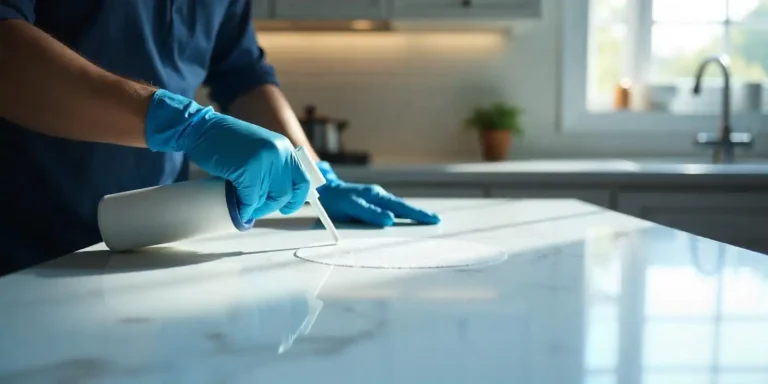
Marble is a timeless and elegant choice for countertops and flooring, but its porous nature makes it vulnerable to stains. Without proper sealing, everyday spills like oil, wine, and coffee can seep into the surface, making it difficult to restore its pristine look. If you’re wondering how to get stains out of marble, the first step to prevention is sealing. A high-quality sealer helps reduce porosity, creating a protective barrier that repels liquids and minimizes the risk of stubborn stains. This simple yet crucial step can save you from the frustration of dealing with discoloration and deep-set marks.
Before sealing, the marble surface must be thoroughly cleaned to ensure no dirt or residue gets trapped. If there are existing stains, it’s important to treat them first. For those struggling with how to clean stained marble, a DIY poultice made from baking soda and water can help draw out discoloration.
Oil-based stains, on the other hand, require a different approach. To remove oil stains from marble, you may need a mixture of baking soda and acetone, applied and left to sit for several hours before wiping away. Once the surface is clean and dry, apply the sealer evenly using a soft cloth or applicator, allowing it to penetrate the stone before buffing off any excess.
Regular maintenance is key to preserving marble’s beauty. Reapplying the sealer every 3–6 months ensures long-lasting protection, especially in high-traffic areas like kitchens and bathrooms.
If you’re considering marble floor installation services in Lowell, proper sealing from the start will enhance durability and maintain its luxurious appeal. By taking these preventive measures, you can enjoy the elegance of marble without the constant worry of unsightly stains.
Pro Tips for Marble Care
Think of marble like a luxury car it thrives on TLC. Start by using coasters or mats under drinks, cosmetics, or even that morning coffee mug. Why? Condensation rings and perfume spills aren’t just stains waiting to happen they’re tiny time bombs for etching. For how to clean stained marble to stay a rare chore, prevention is key. Dust might seem harmless, but those gritty particles? They’re microscopic sandpaper. A quick daily sweep with a microfiber cloth keeps scratches at bay and preserves that mirror-like shine.
After cleaning, dry surfaces immediately with a soft towel. Marble hates lingering moisture it sneaks into pores, inviting water marks or worse. Spilled olive oil? Blot it fast to avoid a frantic remove oil stain from marble mission later. And if you’ve invested in marble floor installation, pair these habits with regular sealing (every 3–6 months) to lock out spills before they strike.
Little effort, big payoff: Treat your marble right, and it’ll stay gallery-worthy for decades.
Psst… Love your marble floors? Explore our expert countertops installation near Lowell to ensure flawless care from day one!
Conclusion
Marble isn’t just a surface it’s a statement. Its veins tell stories of ancient earth, and its glow turns everyday moments into something extraordinary. But like all legends, it thrives on respect. A little proactive care sealing spills fast, avoiding harsh cleaners, and trusting experts when stains dig deep ensures your marble stays as breathtaking as the day it was installed.
Love your marble? Share your favorite care hack in the comments below! Whether it’s a genius poultice trick or a daily habit that keeps stains at bay, your tips could inspire fellow marble lovers.
And if you’re dreaming of a home where marble takes center stage, let SF Marble & Granite make it reality. From flawless marble floor installation to bespoke countertops, we don’t just install stone we craft legacies. Explore our services today and give your space the luxury it deserves.

